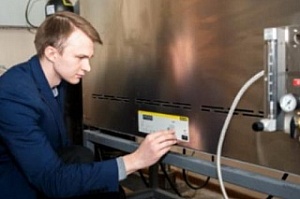TSU physicists are developing a technology for synthesizing smooth ceramics that combine high hardness and a very low coefficient of friction. The ceramics can be sprayed on various things, thereby increasing their wear resistance. The essence of the technology is the use of the compound AlMgB14 (aluminum-magnesium-boron), the physical and mechanical properties of which are much higher than those of existing analogs, and the cost lower.
The composition that the scientists will synthesize is in demand in machine and aircraft engineering. It can be applied to various things that work in extreme conditions: at high temperatures, in constant friction or contact with corrosive substances, and around the clock. Such wear-resistant coatings help to extend service life and, as a result, reduce costs for depreciation and repair. Theoretically, these ceramics even can be sprayed on everyday things, for example, on knives, making them stronger.
The TSU scientists are the only ones in Russia engaged in the application of AlMgB1.
- The closest analogs of AlMgB14 are aluminum oxide, zirconium dioxide, and they are not as smooth. These materials have a coefficient of friction ranging from 0.12 to 0.7, while the coefficient of friction AlMgB14 is one-sixth of that, - explains Pavel Nikitin, one of the participants of the project. - These figures are even smaller than for Teflon, although we all know about Teflon pans.
TSU scientists apply a ceramic coating on a part by magnetron sputtering. For this, they prepare a target from a material based on AlMgB14, a disk that is sprayed onto the desired surface when a strong magnetic pulse is sent to it.
Now, the laboratory staff is working on the technology for a new ceramic coating to prevent the appearance of impurities that worsen the properties of the targets.

